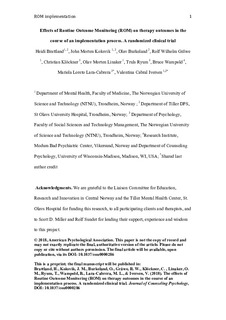| dc.contributor.author | Brattland, Heidi | |
| dc.contributor.author | Koksvik, John Morten | |
| dc.contributor.author | Burkeland, Olav | |
| dc.contributor.author | Gråwe, Rolf W. | |
| dc.contributor.author | Klöckner, Christian A. | |
| dc.contributor.author | Linaker, Olav Morten | |
| dc.contributor.author | Ryum, Truls | |
| dc.contributor.author | Wampold, Bruce E. | |
| dc.contributor.author | Lara, Mariela | |
| dc.contributor.author | Iversen, Valentina Cabral | |
| dc.date.accessioned | 2018-08-30T11:13:18Z | |
| dc.date.available | 2018-08-30T11:13:18Z | |
| dc.date.created | 2018-04-29T00:17:03Z | |
| dc.date.issued | 2018 | |
| dc.identifier.issn | 0022-0167 | |
| dc.identifier.uri | http://hdl.handle.net/11250/2560071 | |
| dc.description.abstract | This study investigated the effects of the Partners for Change Outcome Management System (PCOMS) in adult outpatient treatment at a hospital-based mental health clinic. It also investigated whether the effects differed with the timing of the treatment within a 4-year implementation period, with clients’ initial distress levels, and between therapists. Adult clients (N = 170) were randomized to treatment as usual (TAU) or routine outcome monitoring (ROM). Twenty therapists provided therapy in both conditions. Therapy outcome was measured by the Behavior and Symptoms Identification Scale (BASIS-32). Data were analyzed in a series of multilevel models (MLMs). Clients in the ROM condition were 2.5 times more likely to demonstrate improvement than those in the TAU condition. Controlling for therapist variability, the overall effect size (ES) in favor of ROM was small (d = 0.26, p = .037). The superiority for ROM over TAU increased significantly over the duration of the study. ROM effects were not moderated by clients’ initial distress levels. Differences between therapists accounted for 9%–10% of the variability in outcomes, and there were no significant differences in ROM effects between therapists. ROM was associated with better treatment outcomes independent of clients’ initial distress levels. Clients treated later in the study benefitted more from ROM than those treated earlier. | nb_NO |
| dc.language.iso | eng | nb_NO |
| dc.publisher | American Psychological Association | nb_NO |
| dc.title | The effects of Routine Outcome Monitoring (ROM) in the course of an implementation process - A randomized clinical trial | nb_NO |
| dc.type | Journal article | nb_NO |
| dc.type | Peer reviewed | nb_NO |
| dc.description.version | acceptedVersion | nb_NO |
| dc.source.journal | Journal of Counseling Psychology | nb_NO |
| dc.identifier.doi | 10.1037/cou0000286 | |
| dc.identifier.cristin | 1582337 | |
| dc.description.localcode | © 2018, American Psychological Association. This paper is not the copy of record and may not exactly replicate the final, authoritative version of the article. Please do not copy or cite without authors permission. The final article will be available, upon publication, via its DOI: 10.1037/cou0000286 | nb_NO |
| cristin.unitcode | 194,65,35,0 | |
| cristin.unitname | Institutt for psykisk helse | |
| cristin.ispublished | false | |
| cristin.fulltext | postprint | |
| cristin.qualitycode | 2 | |
